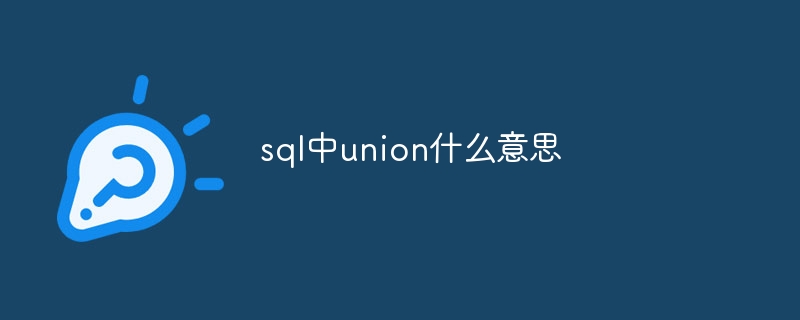What does union mean in sql?
UNION is an operator in SQL used to merge the result sets of two or more SELECT statements. It returns a new result set containing all unique rows. UNION only applies to SELECT statements with the same structure (consistent number of columns and data types) and automatically eliminates duplicate rows.

The meaning of UNION in SQL
UNION is an operator in SQL that is used to combine two or more The result set of multiple SELECT statements with similar results. It combines all unique rows from the two result sets into a new result set.
Detailed description
- Function: UNION is used to combine the results of multiple SELECT statements and return a new result set. Contains all unique rows.
-
Syntax:
SELECT ... FROM ... [UNION] SELECT ... FROM ...
Copy after login - Result set: The result set of UNION contains two (or more) SELECT statements All unique rows in the result. The number of columns and data types of the result set must be consistent.
- Duplicate elimination: The UNION operator automatically eliminates duplicate rows, which means that duplicate data will not appear in the result set.
- Note: The UNION operator is only applicable to SELECT statements with the same structure (consistent number of columns and data types).
Example:
SELECT name, age FROM students UNION SELECT name, age FROM teachers;
Copy after loginThis example will combine all unique # in the
studentsandteacherstables The ##nameandagecolumns are combined into a new result set.
The above is the detailed content of What does union mean in sql?. For more information, please follow other related articles on the PHP Chinese website!

Hot AI Tools

Undresser.AI Undress
AI-powered app for creating realistic nude photos

AI Clothes Remover
Online AI tool for removing clothes from photos.

Undress AI Tool
Undress images for free

Clothoff.io
AI clothes remover

AI Hentai Generator
Generate AI Hentai for free.

Hot Article

Hot Tools

Notepad++7.3.1
Easy-to-use and free code editor

SublimeText3 Chinese version
Chinese version, very easy to use

Zend Studio 13.0.1
Powerful PHP integrated development environment

Dreamweaver CS6
Visual web development tools

SublimeText3 Mac version
God-level code editing software (SublimeText3)

Hot Topics
 1375
1375
 52
52
 What are the different types of data partitioning in SQL (horizontal, vertical)?
Mar 13, 2025 pm 02:01 PM
What are the different types of data partitioning in SQL (horizontal, vertical)?
Mar 13, 2025 pm 02:01 PM
The article discusses horizontal and vertical data partitioning in SQL, focusing on their impact on performance and scalability. It compares benefits and considerations for choosing between them.
 How do I use aggregate functions in SQL to summarize data (SUM, AVG, COUNT, MIN, MAX)?
Mar 13, 2025 pm 01:50 PM
How do I use aggregate functions in SQL to summarize data (SUM, AVG, COUNT, MIN, MAX)?
Mar 13, 2025 pm 01:50 PM
The article explains how to use SQL aggregate functions (SUM, AVG, COUNT, MIN, MAX) to summarize data, detailing their uses and differences, and how to combine them in queries.Character count: 159
 What are the security risks of using dynamic SQL and how can I mitigate them?
Mar 13, 2025 pm 01:59 PM
What are the security risks of using dynamic SQL and how can I mitigate them?
Mar 13, 2025 pm 01:59 PM
The article discusses security risks of dynamic SQL, focusing on SQL injection, and provides mitigation strategies like using parameterized queries and input validation.
 What are the different transaction isolation levels in SQL (READ UNCOMMITTED, READ COMMITTED, REPEATABLE READ, SERIALIZABLE)?
Mar 13, 2025 pm 01:56 PM
What are the different transaction isolation levels in SQL (READ UNCOMMITTED, READ COMMITTED, REPEATABLE READ, SERIALIZABLE)?
Mar 13, 2025 pm 01:56 PM
The article discusses SQL transaction isolation levels: READ UNCOMMITTED, READ COMMITTED, REPEATABLE READ, and SERIALIZABLE. It examines their impact on data consistency and performance, noting that higher isolation ensures greater consistency but ma
 How do I comply with data privacy regulations (GDPR, CCPA) using SQL?
Mar 18, 2025 am 11:22 AM
How do I comply with data privacy regulations (GDPR, CCPA) using SQL?
Mar 18, 2025 am 11:22 AM
Article discusses using SQL for GDPR and CCPA compliance, focusing on data anonymization, access requests, and automatic deletion of outdated data.(159 characters)
 What are the ACID properties of transactions in SQL?
Mar 13, 2025 pm 01:54 PM
What are the ACID properties of transactions in SQL?
Mar 13, 2025 pm 01:54 PM
The article discusses the ACID properties (Atomicity, Consistency, Isolation, Durability) in SQL transactions, crucial for maintaining data integrity and reliability.
 How do I secure my SQL database against common vulnerabilities like SQL injection?
Mar 18, 2025 am 11:18 AM
How do I secure my SQL database against common vulnerabilities like SQL injection?
Mar 18, 2025 am 11:18 AM
The article discusses securing SQL databases against vulnerabilities like SQL injection, emphasizing prepared statements, input validation, and regular updates.
 How do I implement data partitioning in SQL for performance and scalability?
Mar 18, 2025 am 11:14 AM
How do I implement data partitioning in SQL for performance and scalability?
Mar 18, 2025 am 11:14 AM
Article discusses implementing data partitioning in SQL for better performance and scalability, detailing methods, best practices, and monitoring tools.




